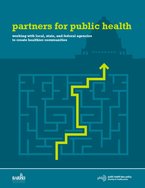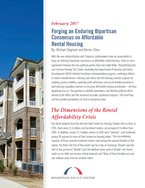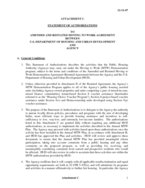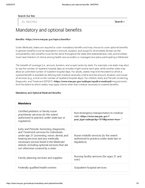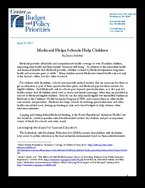0
Publication
Community:
Jul 13, 2018
This guide is intended to provide information to public health department staff and advocates about the many public agencies that make policy decisions and implement projects related to the physical environment.
Authored by:
Topics: Child welfare, Community development, Education, Exercise, Green, Health, Housing, Legislation & Policy, Place-based, Safety, Smoke-free, Stability, Substance abuse, West Coast
 Shared by Housing Is
Shared by Housing Is
Housing Is posted a
on Jul 13, 2018
This guide is intended to provide information to public health department staff and advocates about the many public agencies that make policy decisions and implement projects related to the physical environment.
0
Publication
Community:
Jul 12, 2018
This brief aims to bring attention to non-Medicaid funding sources that states could potentially blend or braid to address social determinants of health and other needs that are not typically covered by Medicaid. It is intended to familiarize state Medicaid, public health, and other state policymakers with the funding streams of other agencies, and sketch out a continuum of options to help states coordinate funding to better serve the needs of low-income populations. Because this brief focuses on services for adult Medicaid beneficiaries, it does not address many of the funding sources available for children’s services. However, existing efforts to pool funds for children and youth—notably by the Commonwealth of Virginia—could prove instructive for states seeking to launch such an effort for adults.
Authored by:
Topics: Cost effectiveness, Data sharing, Dual-eligibles, Food insecurity, Funding, Health, Homelessness, Housing, Legislation & Policy, Low-income, Medicaid / Medicare, Mental health, Partnerships, Research, Substance abuse
 Shared by Housing Is
Shared by Housing Is
Housing Is posted a
on Jul 12, 2018
This brief aims to bring attention to non-Medicaid funding sources that states could potentially blend or braid to address social determinants of health and other needs that are not typically covered by Medicaid.
0
Publication
Community:
Jul 12, 2018
With the new administration and Congress, policymakers have an opportunity to forge an enduring bipartisan consensus on affordable rental housing. There is more agreement between the two political parties than one might think: Strengthening the Low-Income Housing Tax Credit, expanding the Department of Housing and Urban Development (HUD)’s Rental Assistance Demonstration program, continuing efforts to reduce homelessness, infusing real choice into the housing voucher program by enabling greater mobility, expanding self-sufficiency and asset-building incentives, and reducing regulatory barriers to increase affordable housing production—all have bipartisan buy-in. The question is whether lawmakers can find the political will to devote to the effort and the resources to make significant progress. This brief lays out the possible parameters of such a consensus plan.
Authored by:
Topics: Dual-generation, Funding, Homelessness, Housing, Legislation & Policy, Low-income, Mobility, RAD, Research
 Shared by Housing Is
Shared by Housing Is
Housing Is posted a
on Jul 12, 2018
With the new administration and Congress, policymakers have an opportunity to forge an enduring bipartisan consensus on affordable rental housing.
0
Publication
Community:
Jul 12, 2018
This report examines four specific aspects of the challenge before us:
• The need for a much greater supply of homes affordable to our nation’s lowest-income seniors.
• The importance of transforming homes and communities so that seniors can age with options, a desire shared by the overwhelming majority of older adults.
• The imperative to better integrate health care and supportive services with housing, recognizing that this integration has the potential to improve health outcomes for seniors and reduce the costs borne by the health care system.
• The need to deploy technologies on a far wider scale to help all Americans age successfully.
Authored by:
Topics: Cost effectiveness, Funding, Health, Home visiting, Homelessness, Housing, Legislation & Policy, Low-income, Medicaid / Medicare, Partnerships, Place-based, Preventative care, Seniors, Supportive housing
 Shared by Housing Is
Shared by Housing Is
Housing Is posted a
on Jul 12, 2018
This report examines four specific aspects of the challenge before us:
• The need for a much greater supply of homes affordable to our nation’s lowest-income seniors.
• The importance of transforming homes and communities so that seniors can age with options, a desire shared by the overwhelming ma
0
Publication
Community:
Jul 12, 2018
The purpose of the Statement of Authorizations is to delegate to the Agency the authority to pursue locally driven policies, procedures and programs with the aim of developing better, more efficient ways to provide housing assistance and incentives to self-sufficiency to low, very-low, and extremely low-income families.
Authored by:
Topics: Cost effectiveness, Family engagement, MTW
 Shared by Housing Is
Shared by Housing Is
Housing Is posted a
on Jul 12, 2018
The purpose of the Statement of Authorizations is to delegate to the Agency the authority to pursue locally driven policies, procedures and programs with the aim of developing better, more efficient ways to provide housing assistance and incentives to self-sufficiency to low, very-low, and extremely
0
Publication
Community:
Jul 12, 2018
Authored by:
Topics: Child welfare, Dental, Early childhood, Education, Exercise, Family engagement, Health, Housing, Medicaid / Medicare, Mental health, Nutrition, Partnerships, Place-based, Preventative care, Seniors, Vision
 Shared by Housing Is
Shared by Housing Is
Housing Is posted a
on Jul 12, 2018
0
Policy Brief
Community:
Jul 10, 2018
This brief explores how state Medicaid agencies have utilized a variety of federal authorities and delivery systems to increase access to supportive housing services and highlights important implementation considerations.
Authored by:
Topics: Cost effectiveness, Criminal justice, Data sharing, Funding, Health, Healthy homes, Homelessness, Housing, Legislation & Policy, Low-income, Medicaid / Medicare, Mental health, Partnerships, Substance abuse, Supportive housing
 Shared by Housing Is
Shared by Housing Is
Housing Is posted a
on Jul 10, 2018
This brief explores how state Medicaid agencies have utilized a variety of federal authorities and delivery systems to increase access to supportive housing services and highlights important implementation considerations.
0
Policy Brief
Community:
Jul 10, 2018
Under Medicaid, states are required to cover mandatory benefits and may choose to cover optional benefits. In general, benefits must be equivalent in amount, duration, and scope for all enrollees (known as the comparability rule); benefits must be the same throughout the state (the statewideness rule); and enrollees must have freedom of choice among health care providers or managed care plans participating in Medicaid.
Authored by:
Topics: Health, Low-income, Medicaid / Medicare
 Shared by Housing Is
Shared by Housing Is
Housing Is posted a
on Jul 10, 2018
Under Medicaid, states are required to cover mandatory benefits and may choose to cover optional benefits.
0
Policy Brief
Community:
Jul 10, 2018
This brief provides an overview of current federal standards and state options in Medicaid to help inform upcoming debates about increasing state flexibility in the program as part of efforts to restructure Medicaid financing.
Authored by:
Topics: Affordable Care Act, Cost effectiveness, Funding, Health, Legislation & Policy, Low-income, Medicaid / Medicare
 Shared by Housing Is
Shared by Housing Is
Housing Is posted a
on Jul 10, 2018
This brief provides an overview of current federal standards and state options in Medicaid to help inform upcoming debates about increasing state flexibility in the program as part of efforts to restructure Medicaid financing.
0
Publication
Community:
Jul 10, 2018
Working Together to Meet Unmet Housing and Healthcare Needs
Authored by:
Topics: Affordable Care Act, Data sharing, Health, Homelessness, Housing, Low-income, Medicaid / Medicare, Mental health, Partnerships, Stability, Substance abuse, Supportive housing
 Shared by Housing Is
Shared by Housing Is
Housing Is posted a
on Jul 10, 2018
Working Together to Meet Unmet Housing and Healthcare Needs
0
Policy Brief
Community:
Jul 10, 2018
Children’s HealthWatch's brief "asks two straightforward questions: If health starts at home, what are the healthcare and educational costs of unstable housing? Which policy solutions could create stable homes for healthier families?"
Authored by: Children's Health Watch
Topics: Asthma, Child welfare, Dental, Early childhood, Education, Foster care, Grade-level proficiency, Health, Healthy homes, Housing, Lead, Literacy, Low-income, Medicaid / Medicare, Obesity, Partnerships, Pre-natal, Preventative care, Racial inequalities, School-readiness, Stability, Vision, Youth
 Shared by Steve Lucas
Shared by Steve Lucas
Steve Lucas posted a
on Jul 10, 2018
Children’s HealthWatch's brief "asks two straightforward questions: If health starts at home, what are the healthcare and educational costs of unstable housing? Which policy solutions could create stable homes for healthier families?"
0
Publication
Community:
Jun 8, 2017
A multi-faceted technical assistance resource for Public Housing Agencies and their partners who want to end homelessness. The Tookit is organized into five main sections: (1) Housing Choice Vouchers, (2) Public Housing, (3) Project-Based Vouchers, (4) Unique PHA Programs & Initiatives, (5) Primer on Homelessness ans Supportive Housing.
Authored by: Corporation for Supportive Housing (CSH)
Topics: Homelessness, Housing, Medicaid / Medicare, Partnerships, Substance abuse, Supportive housing
 Shared by Steve Lucas
Shared by Steve Lucas
Steve Lucas posted a
on Jun 8, 2017
Corporation for Supportive Housing (CSH)
A multi-faceted technical assistance resource for Public Housing Agencies and their partners who want to end homelessness.
1
Policy Brief
Community:
Apr 19, 2017
For eligible children, Medicaid pays for the medical services schools provide to students with disabilities so they can get an education.
Authored by:
Topics: Child welfare, Education, Medicaid / Medicare
 Shared by Steve Lucas
Shared by Steve Lucas
Steve Lucas posted a
on Apr 19, 2017
Medicaid provides affordable and comprehensive health coverage to over 30 million children. It also plays a little known but important role in supporting schools and making sure students, especially those with disabilities, get the care and services they need to succeed.
For eligible children, Medicaid pays for the medical services schools provide to students with disabilities so they can get an education.
0
Policy Brief
Community:
Feb 16, 2017
Supporting parents' efforts to help their children develop during the preschool years improves a child's school readiness, reduces behavior problems, enhances social skills, and promotes academic success.
Authored by: Bierman K, Morris P, and Abenavoli R for THE ROBERT WOOD JOHNSON FOUNDATION
Topics: Early childhood, Education, Family engagement, School-readiness
 Shared by Abra Lyons-Warren
Shared by Abra Lyons-Warren
Abra Lyons-Warren posted a
on Feb 16, 2017
Bierman K, Morris P, and Abenavoli R for THE ROBERT WOOD JOHNSON FOUNDATION
Supporting parents' efforts to help their children develop during the preschool years improves a child's school readiness, reduces behavior problems, enhances social skills, and promotes academic success.
 Shared by Housing Is
on Jul 13, 2018
Shared by Housing Is
on Jul 13, 2018
 Shared by Housing Is
on Jul 12, 2018
Shared by Housing Is
on Jul 12, 2018
 Shared by Housing Is
on Jul 12, 2018
Shared by Housing Is
on Jul 12, 2018
 Shared by Housing Is
on Jul 12, 2018
Shared by Housing Is
on Jul 12, 2018
 Shared by Housing Is
on Jul 12, 2018
Shared by Housing Is
on Jul 12, 2018
 Shared by Housing Is
on Jul 12, 2018
Shared by Housing Is
on Jul 12, 2018
 Shared by Housing Is
on Jul 10, 2018
Shared by Housing Is
on Jul 10, 2018
 Shared by Housing Is
on Jul 10, 2018
Shared by Housing Is
on Jul 10, 2018
 Shared by Housing Is
on Jul 10, 2018
Shared by Housing Is
on Jul 10, 2018
 Shared by Housing Is
on Jul 10, 2018
Shared by Housing Is
on Jul 10, 2018
 Shared by Steve Lucas
on Jul 10, 2018
Shared by Steve Lucas
on Jul 10, 2018
 Shared by Steve Lucas
on Jun 8, 2017
Shared by Steve Lucas
on Jun 8, 2017
 Shared by Steve Lucas
on Apr 19, 2017
Shared by Steve Lucas
on Apr 19, 2017
 Shared by Abra Lyons-Warren
on Feb 16, 2017
Shared by Abra Lyons-Warren
on Feb 16, 2017




